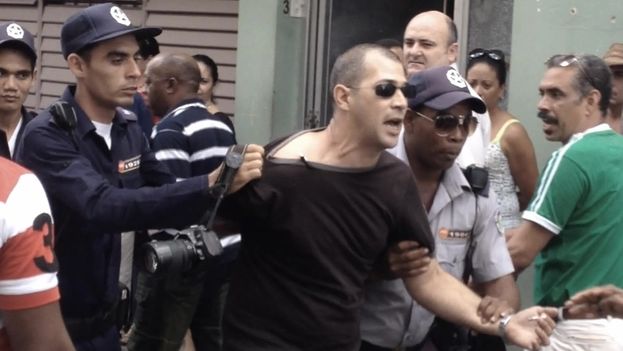
The Island is among the top ten countries of the world with the greatest censorship
![]() 14ymedio, Havana, 21 April 2015 – The control that the Cuban government exercises over the media was one of the strictest in the world in 2014 and the most rigid in the Americas, according to the report published Tuesday by the Committee For the Protection of Journalists (CPJ). The nonprofit organization with headquarters in New York, which works to protect the world’s press freedom, puts Havana in 10th place on the list of States with the highest levels of censorship but notes “significant progress” in recent years.
14ymedio, Havana, 21 April 2015 – The control that the Cuban government exercises over the media was one of the strictest in the world in 2014 and the most rigid in the Americas, according to the report published Tuesday by the Committee For the Protection of Journalists (CPJ). The nonprofit organization with headquarters in New York, which works to protect the world’s press freedom, puts Havana in 10th place on the list of States with the highest levels of censorship but notes “significant progress” in recent years.
The CPJ’s report stresses that “print and broadcast media are totally controlled by the single party and have to be ‘in line with the objectives of the socialist society.’ Although the Internet offers some space for critics, the service providers block the undesired content,” as is the case with 14ymedio. The organization highlights the difficult situation of independent journalists and bloggers who have to use websites hosted outside of the Island or access foreign embassies or hotels in order to have an unfiltered Internet connection. In spite of the opening of some critical spaces, this content mostly continues to be inaccessible to Cubans who still do not have a high speed Internet connection.
The research by CPJ highlights that visas for international journalists are awarded selectively and that the Government “continues to persecute critical journalists through harassment, surveillance and short-duration detentions,” citing the cases of Juliet Michelena Diaz and Angel Santiesteban Prats.
The greatest worry in the case of Eritrea centers on the possible death of five journalists arrested in May 2001, about which exiled colleagues raised the alert. Faced with the impossibility of being able to confirm it, the CPJ keeps the professionals on the list of prisoners in order to prevent the case from falling into oblivion.
North Korea, with tightly controlled and centralized information, occupies second place on the list. The official number of people possessing mobile telephones (excluding those that arrive as contraband from China) is about 9.7%. The control of information in the Asian country is so remarkable that all mention of Jang Song Thaek, the ousted and then executed uncle of the leader Kim Jong-Un, has been eliminated even to the point of editing the audio-visual material in which he appeared in order to suppress images of him.
The tactics used by Eritrea and North Korea are repeated to different degrees in other countries with strong censorship. The repressive regimes cling to power thanks to a combination of monopoly over the media, harassment, surveillance, threats of prison for journalists and restrictions on the entry of and movement by foreign correspondents.
Seven of the ten countries with the greatest censorship – Eritrea, Ethiopia, Azerbaijan, Vietnam, Iran, China and Burma – are also among the world’s greatest jailors of journalists, according to CPJ’s annual prison census.
In Saudi Arabia – the country with the third greatest censorship – the monarchy in power does not limit itself to silencing domestic dissidence, and partners with other Governments of the Gulf Cooperation Council in order to assure that criticism of institutions in each of these countries is harshly repressed.
In Ethiopia – fourth in the ranking of countries that censor – the threat of prison has contributed to a strong increase in the number of exiled journalists. The anti-terrorism law approved in 2009, which criminalizes any coverage that according to authorities “foments” or “offers moral support” to illegal groups, has been imposed on many of the 17 journalists who are prisoners of the country’s jails.
Vietnam – the sixth most-censored country – uses a vague law against “the abuse of democratic liberty” in order to incarcerate bloggers, and Burma – the ninth – is supported by the Official Secrets Act of 1923 in order to prevent criticism of its military forces.
In Azerbaijan – the fifth most-censored country – the criminal defamation laws have been extended to social networks and can carry up to six months in jail. Iran, seventh on the list, has one of the world’s strictest Internet censorship regimens, with millions of websites blocked.
The other four countries (Belarus, Equatorial Guinea, Uzbekistan and Turkmenistan) were close in finishing the ranking, since they all have every few independent media outlets.
Translated by MLK
